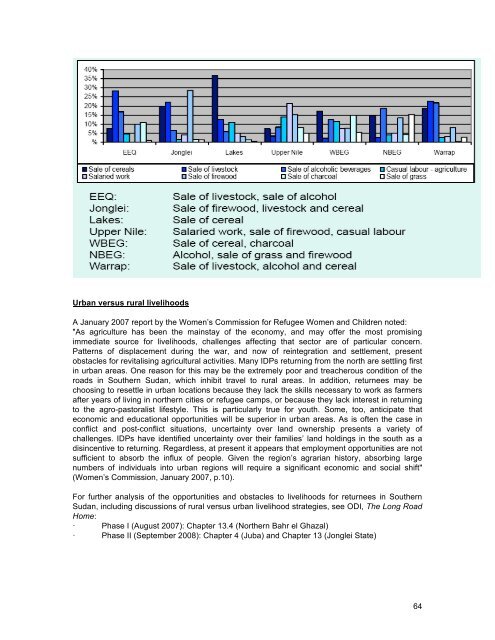SUDAN: Durable solutions elusive as southern IDPs return and ...
SUDAN: Durable solutions elusive as southern IDPs return and ...
SUDAN: Durable solutions elusive as southern IDPs return and ...
You also want an ePaper? Increase the reach of your titles
YUMPU automatically turns print PDFs into web optimized ePapers that Google loves.
Urban versus rural livelihoods<br />
A January 2007 report by the Women’s Commission for Refugee Women <strong>and</strong> Children noted:<br />
"As agriculture h<strong>as</strong> been the mainstay of the economy, <strong>and</strong> may offer the most promising<br />
immediate source for livelihoods, challenges affecting that sector are of particular concern.<br />
Patterns of displacement during the war, <strong>and</strong> now of reintegration <strong>and</strong> settlement, present<br />
obstacles for revitalising agricultural activities. Many <strong>IDPs</strong> <strong>return</strong>ing from the north are settling first<br />
in urban are<strong>as</strong>. One re<strong>as</strong>on for this may be the extremely poor <strong>and</strong> treacherous condition of the<br />
roads in Southern Sudan, which inhibit travel to rural are<strong>as</strong>. In addition, <strong>return</strong>ees may be<br />
choosing to resettle in urban locations because they lack the skills necessary to work <strong>as</strong> farmers<br />
after years of living in northern cities or refugee camps, or because they lack interest in <strong>return</strong>ing<br />
to the agro-p<strong>as</strong>toralist lifestyle. This is particularly true for youth. Some, too, anticipate that<br />
economic <strong>and</strong> educational opportunities will be superior in urban are<strong>as</strong>. As is often the c<strong>as</strong>e in<br />
conflict <strong>and</strong> post-conflict situations, uncertainty over l<strong>and</strong> ownership presents a variety of<br />
challenges. <strong>IDPs</strong> have identified uncertainty over their families’ l<strong>and</strong> holdings in the south <strong>as</strong> a<br />
disincentive to <strong>return</strong>ing. Regardless, at present it appears that employment opportunities are not<br />
sufficient to absorb the influx of people. Given the region’s agrarian history, absorbing large<br />
numbers of individuals into urban regions will require a significant economic <strong>and</strong> social shift"<br />
(Women’s Commission, January 2007, p.10).<br />
For further analysis of the opportunities <strong>and</strong> obstacles to livelihoods for <strong>return</strong>ees in Southern<br />
Sudan, including discussions of rural versus urban livelihood strategies, see ODI, The Long Road<br />
Home:<br />
· Ph<strong>as</strong>e I (August 2007): Chapter 13.4 (Northern Bahr el Ghazal)<br />
· Ph<strong>as</strong>e II (September 2008): Chapter 4 (Juba) <strong>and</strong> Chapter 13 (Jonglei State)<br />
64
















